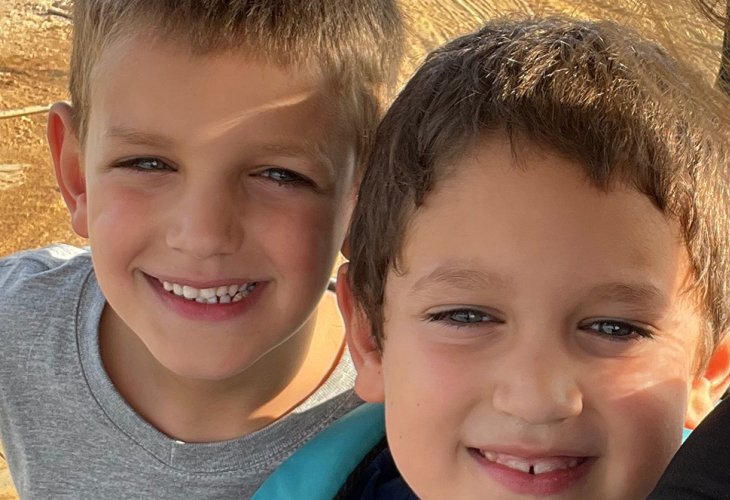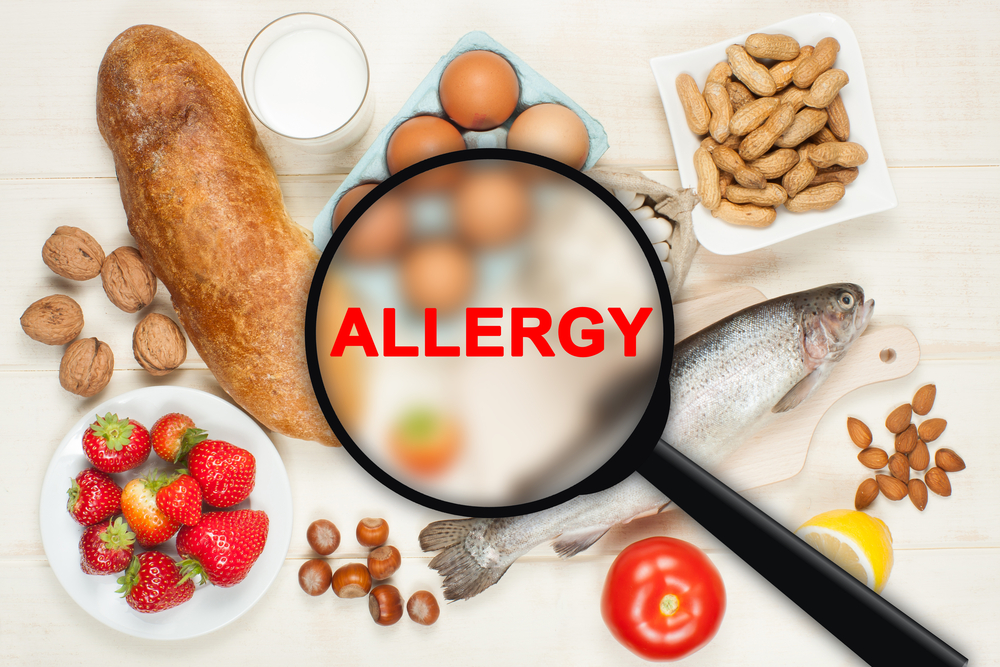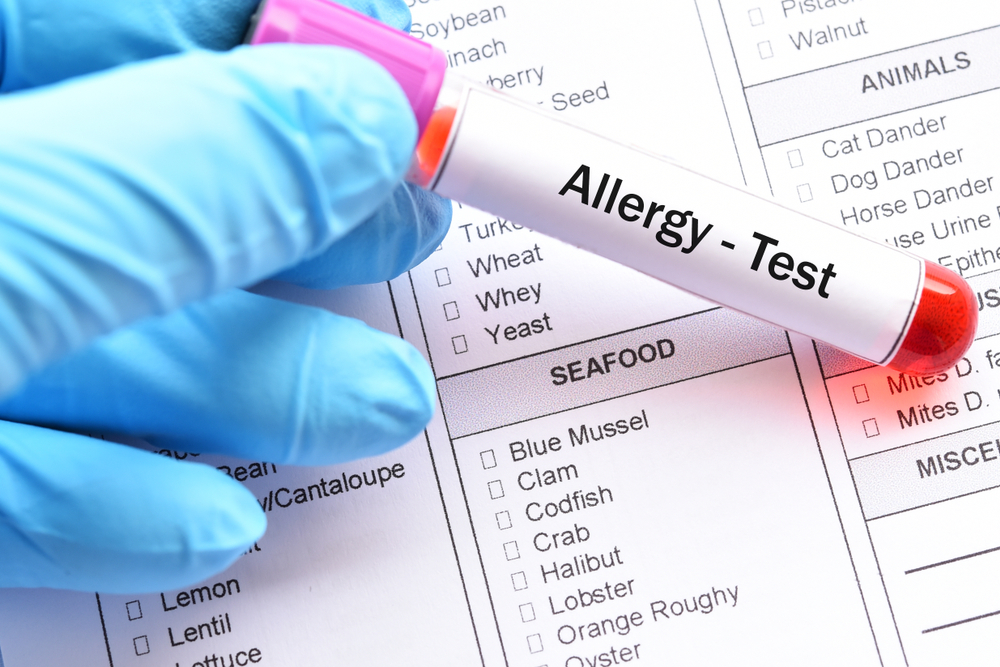"When My Kids Go Outside, I Am Terrified to Death"
When Ma'oz Ben-Avi Ashkenazi's eldest son came home from kindergarten with red marks, she assumed other children had bitten him. After he collapsed from eating nuts, she realized it was an allergy. A year later, her second son was also diagnosed with a severe allergy. How do you navigate life knowing both of your children are at risk?
 Nitay and Harel
Nitay and HarelMa'oz Ben-Avi Ashkenazi was only 21 when her eldest son was diagnosed with a severe, dangerous allergy. "I was a very young mother," she recalls, "and every day when I picked up Nitay from kindergarten, I gave him some Bamba on the way home. In the evening, while bathing him, I noticed his back covered with red spots. At that time, I didn't consider allergies. I was sure there were children in the kindergarten biting him. Those days, I repeatedly complained to the kindergarten teachers and parents that I would not tolerate children biting my son."
Then came the day Ma'oz left Nitay with her mother, who decided to treat him to a date and nut ball. The results were beyond her imagination: within moments, Nitay had a severe reaction, with blisters appearing all over his body, he started choking and was rushed to the hospital in an ambulance in need of resuscitation. At the hospital, after they stabilized him with adrenaline injections, allergy tests showed he was dangerously allergic to nuts and also had a peanut sensitivity. "Only then did I connect the spots on his back with the Bamba," Ma'oz shares, "From that day, peanuts and nuts disappeared from our house, and we made every effort to keep them away from our surroundings."
 (Photo: shutterstock)
(Photo: shutterstock)
A Repeat Scenario
When Nitay was a year old, his brother Harel was born. This time, Ma'oz was more experienced, and when Harel reached six months and began tasting new foods, she was exceedingly careful, aware that severe allergic reactions might appear as with Nitay. "I never gave him several new foods at once," she recounts, "I only introduced one food at a time, so if there were an allergy, we would know exactly its source. Additionally, I only gave tastings when someone else was home, and as strange as it sounds, I tried not to do so during rush hours, in case we needed to rush him to the hospital and avoid wasting time."
One Shabbat morning, while her husband was home, Ma'oz felt it was the right time to offer young Harel an egg. "I gave him a tiny taste at the tip of the spoon," she describes, "and the reaction was immediate. Harel, sitting in an Ikea high chair, collapsed along with the chair to the floor, foaming at the mouth, with blisters emerging. His face swelled so much that it appeared his whole body and head were unified without any visible neck. It didn’t take much to realize that we were facing the same scenario again, only this time tests indicated Harel was allergic to eggs."
At that point, Ma'oz and her husband also wanted to check if Harel was allergic to peanuts, as they had no way of testing at home due to his brother's allergy. "They did a 'test' for peanuts and discovered he was also very allergic," Ma'oz details.
From that moment, their lives changed entirely. "Realizing our kids have life-threatening allergies, we decided not to take any risks," Ma'oz clarifies. "For example, we sent them to vegan kindergartens outside of town because only there could they assure us there would be no eggs or nuts. These are children who hardly ever go to parks because there's always a risk of coming into contact with foods that could endanger them. The only time we tried taking them to a show, we immediately regretted it because of the overwhelming amount of Bamba. In general, we've learned to live without spontaneity; every outing requires thorough preparation and thought. It's something we constantly consider."
 (Photo: shutterstock)
(Photo: shutterstock)But how can you protect the kids? Even a simple outing, taking a train or bus ride, can expose them to dangerous allergens?
"Exactly, these are kids who have never traveled by bus or train. I never send them to friends' houses, and dining out is not an option. We also don't take them on vacations away from home. Shopping at the supermarket is a mission in itself: each time, we go through the ingredients list of every product to ensure nothing has changed. Needless to say, this makes shopping very time-consuming."
Do manufacturers usually label allergens as required?
"I trust the big companies 100%, but I'm less confident in smaller firms, especially since there's no law enforcing labeling in Israel. Manufacturers label at their own discretion, and I never buy ready-made food."
Mortal Fear
Now, Nitay and Harel are in first and second grades, and Ma'oz notes that their classrooms are completely clean of allergens. "The parents collaborate beautifully and strictly avoid sending foods that could pose a risk to my kids. I deeply appreciate them; it's not something to be taken for granted. One mother even contacted me while buying ingredients for her son's birthday cake, photographing each product to ensure it didn’t contain anything problematic. Additionally, each of my children has a medical assistant with them throughout the school day to ensure they don't encounter any danger."
Have the children experienced any more attacks since the initial episodes?
"Nitay has had eight attacks, and Harel only two. This is likely because it's easier to avoid eggs, whereas nuts can be nearly everywhere, and even tiny traces can trigger an allergy. There's always someone assuring you, 'This is chocolate spread!' and it turns out to be nut spread. Sadly, whenever they have an episode, it's a real life-threatening situation. We can never be complacent about it."
Do you think they find it hard? Do they complain about it?
"They were practically born into this and don’t know a better reality. Still, I must note that recently we took Nitay for tests due to a digestive issue, and there he lamented, 'Why do all the bad things happen to me? First the allergy and now another illness.' It was the first time I heard him express that the allergy is 'bad.'"
And what do you actually tell a child in such a situation?
"I told my son he was right, and I had no answer to give him because mothers don’t always have all the answers. I also expressed hope that we'd discover his current issue is reversible, unlike the allergy."
Is it possible the allergy might eventually be reversible?
"Yes, there's a treatment known as 'slow exposure to the allergen' where the child is gradually exposed to minimal amounts until the body learns to recognize it. We take the kids for a yearly check to determine if they’re eligible for such a treatment. Currently, there's talk about them potentially starting treatment for peanuts, but not for eggs and nuts, where they aren't even candidates yet. "
"It should also be noted that these treatments are very costly; exposure to each allergen costs about 15,000 shekels. When talking about nuts, exposure to various types is needed – pecan, hazelnut, walnut, macadamia, and more. The cost isn't an issue – if treatment becomes possible, I'll raise whatever sum is necessary. But it seems unreasonable for such expenses to be demanded when I personally know of parents who can't afford such costs and therefore don't treat their children's allergies."
 (Photo: shutterstock)
(Photo: shutterstock)Every now and then, we hear about someone accidentally exposed to a dangerous allergen and being harmed. How do you feel about that?
"It terrifies me and underscores the importance of wrapping our children in cotton wool and protecting them at all costs. Personally, I even share these harrowing stories with my kids. Not because I think it's healthy for them to hear about such horrible cases but to prepare them for the day they’ll reach an age when they won’t want my hand by their side all the time. I know we are very close to the moment when they'll insist on going to a friend or heading out on their own, and I'm terribly afraid of that moment. Really afraid to death."

